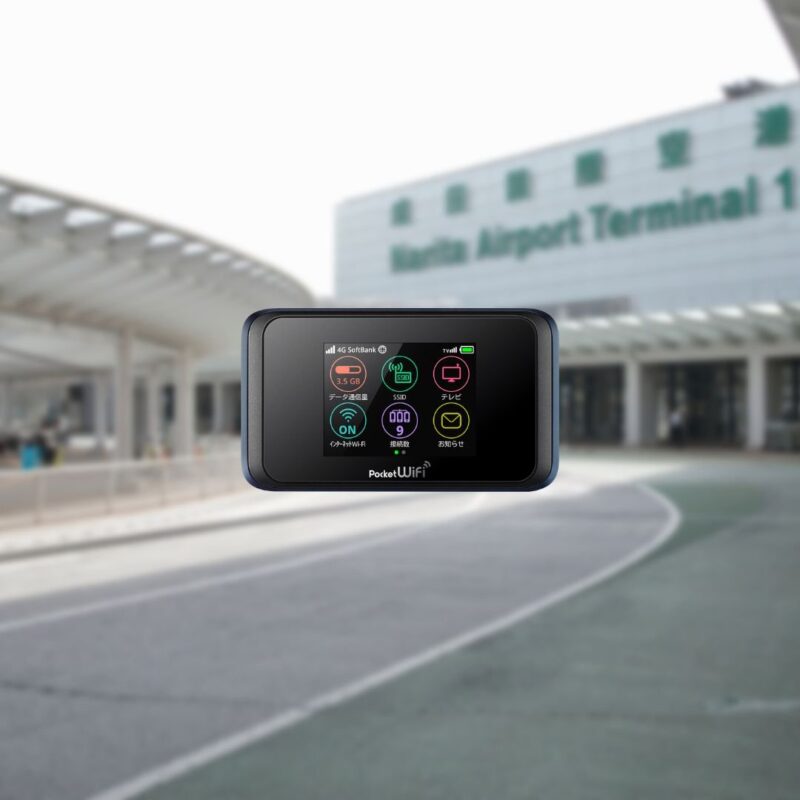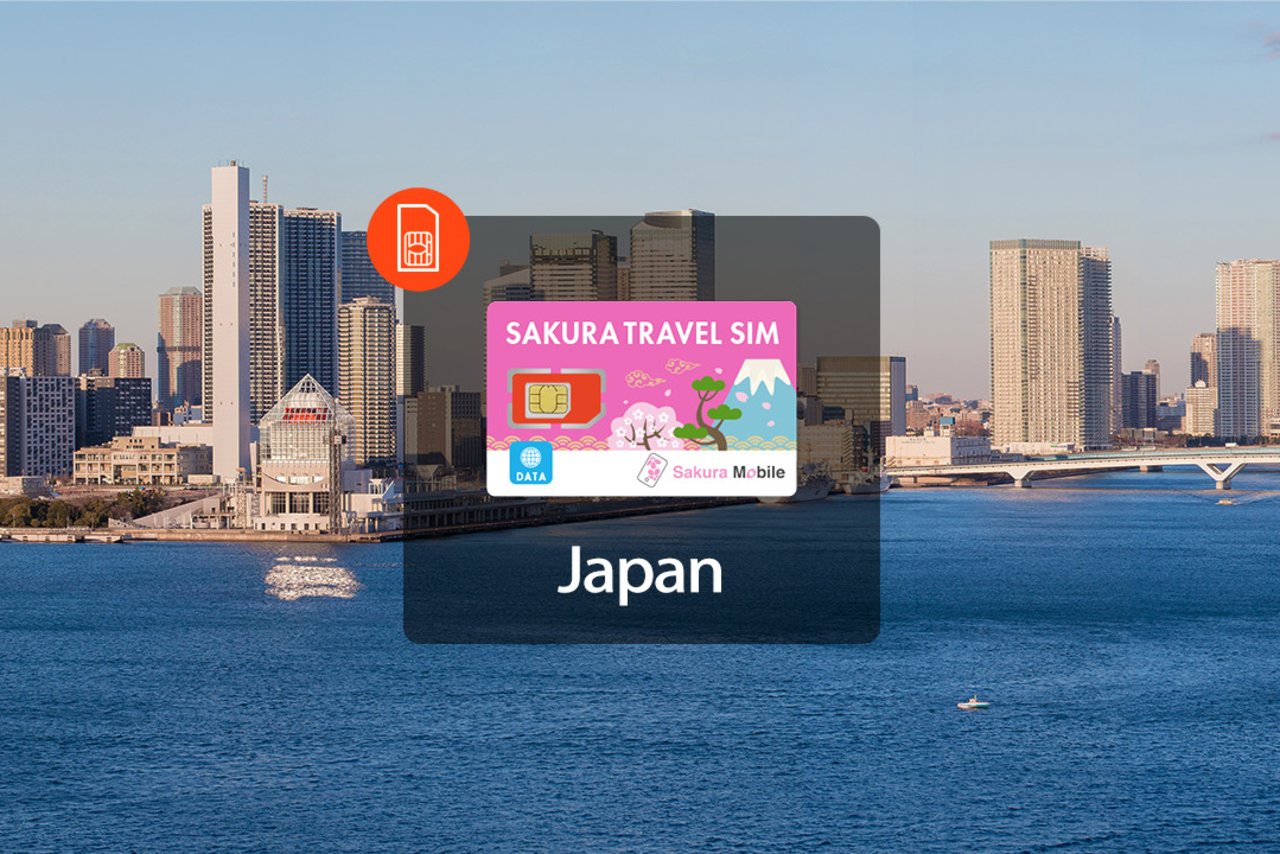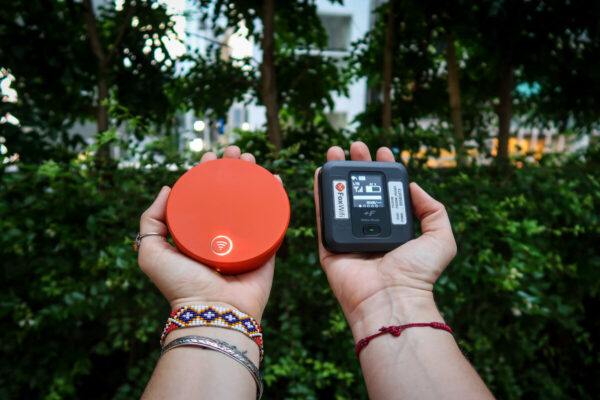When it comes to ensuring seamless connectivity during your travels in Japan, the choice between a Japan pocket WiFi vs SIM card becomes a pivotal decision. This debate is particularly common for tourists, and for those visiting Japan for the first time, it can be even more challenging.
As a frequent traveler, I, too, found myself grappling with the decision between Japan’s pocket WiFi and SIM card options. After several trials, I decided to share my insights through an article aimed at helping fellow travelers comprehend the nuances of these two connectivity solutions. I also provide a detailed comparison so you can make a decision for a smooth and reliable internet experience.
Related posts:
Pocket wifi in Japan: An overview

I understand the challenges of navigating through unfamiliar WiFi passwords and deciphering Japanese-language WiFi instructions while traveling. It can be quite daunting, and that’s why opting for a pocket wifi device proved to be a game-changer.
These small, portable routers provide high-speed internet access for multiple devices, allowing you to stay connected with friends and family, use navigation apps, and access information on the go.
It will be best if you buy it online to customize your requirements. Many companies offer online reservation and delivery services for pocket wifi devices. This allows you to pick up the device at the airport or your accommodation, saving time upon arrival.
Popular online retailers include:
- Sakura Mobile
- RentaNet
- EConnect Japan
Recommendation: The 5 best pocket wifi in Japan
Data SIM card in Japan: An overview

While it is still a traditional and time-consuming option, a SIM card remains an effective method. It is a small chip that stores information about your mobile network operator and provides internet access to your unlocked smartphone. Unlike pocket Wi-Fi, which creates a separate Wi-Fi network for multiple devices, a data SIM card replaces your current SIM card, transforming your phone into a portable hotspot.
Most major airports in Japan, like Narita and Haneda in Tokyo, have kiosks or stores selling SIM cards. These are convenient options if you’re arriving in Japan and need immediate connectivity.
Popular providers at airports include:
- Mobal
- IIJmio Japan Travel SIM
- B-Mobile
If you’re looking for a quick and readily available solution, you can find them in any convenience stores or electronics stores like Bic Camera and Yodobashi Camera. This allows you to compare options and choose the best fit for your needs.
Recommendation: The 5 best SIM cards for Japan travel
Pocket wifi vs SIM card in Japan: What’s the difference?
Pocket WiFi and SIM card Japan are both options for accessing the internet, but they have different characteristics.
| Feature | Pocket Wifi | SIM Card |
| Device | Separate portable device | Replaces existing SIM |
| Connectivity | Multiple devices | Single device (acts as hotspot) |
| Cost | Generally more expensive | More Affordable |
| Convenience | Easy to use | Requires SIM change |
| Flexibility | Often offers unlimited data | Varies by plan |
| Suitability | Groups or multiple devices | Budget travelers or single device |
Device
A pocket WiFi router, a portable device acting as a mobile hotspot, facilitates multiple devices connecting to it. Conversely, a SIM card is a small card inserted directly into a smartphone or tablet.
Connectivity
Second, the advantage of a pocket WiFi lies in its ability to be shared among multiple users or devices, making it ideal for group travel. Conversely, a SIM card may prove more cost-effective for individual travelers.
Notably, using a SIM card requires an unlocked phone compatible with the local network, a requirement absent with pocket WiFi. The choice between the two hinges on factors such as the number of users, cost considerations, and device compatibility.
Cost
When examining costs, a pocket WiFi typically ranges from 4,000 to 6,000 JPY per week or 8,000 to 12,000 JPY per month. In contrast, the price of a prepaid SIM card varies depending on the data plan and duration of use.
Convenience
The convenience of each option became evident in day-to-day usage. Pocket WiFi, with its dedicated device, simplified the process of accessing the internet. Turning on the device instantly created a WiFi network, making it a hassle-free experience. Conversely, utilizing a SIM card required a bit more effort, involving the process of swapping out the existing SIM in my device. This extra step, although not overly complicated, added a layer of complexity compared to the straightforward nature of Pocket WiFi.
Flexibility
Flexibility, in terms of data usage, became a crucial consideration. Pocket WiFi plans often included options for unlimited data, providing peace of mind for activities like video streaming or uploading high-resolution photos. This flexibility proved valuable, especially in situations where a reliable and consistent internet connection was paramount. SIM cards, while offering various plans, necessitated careful selection to ensure sufficient data allowance, making them slightly less flexible in certain usage scenarios.
Suitability
Considering the suitability of each option for specific travel circumstances, Pocket WiFi emerged as the preferred choice for group travel or situations involving multiple devices. Its centralized approach to connectivity streamlined communication and collaboration. On the other hand, a SIM card’s simplicity and cost-effectiveness made it a more suitable option for solo travelers or those with minimal connectivity needs, providing a straightforward and economical solution without the need for additional devices.
Should I use pocket wifi or a SIM card in Japan?

The choice between using a pocket WiFi or a SIM card in Japan depends on your specific needs and preferences. Pocket WiFi devices are portable hotspots that provide internet connectivity for multiple devices, offering the advantage of flexibility and convenience.
They are suitable for travelers who require constant, reliable internet access on various devices and want to avoid the hassle of switching SIM cards or dealing with compatibility issues.
On the other hand, using a local SIM card in your unlocked smartphone can be a more straightforward option for those who prioritize simplicity and only need internet access on a single device.
Here are some specific recommendations:
- Pocket wifi: Choose this if you:
- Are traveling with a group
- Need unlimited data
- Prefer convenience and don’t want to worry about data usage
- SIM card: Choose this if you:
- Are traveling solo
- Are on a budget
- Have an unlocked phone and want to save space by not carrying an additional device
- Have moderate data needs
Wrap up
In conclusion, deciding Japan pocket WiFi vs SIM card boils down to your specific needs and preferences. The choice hinges on factors such as the number of devices you need to connect, the duration of your stay, and your desire for simplicity versus flexibility.
Ultimately, understanding your priorities and weighing the pros and cons of each option will empower you to make an informed decision. Moreover, don’t forget to like and share this article with your friends!
















